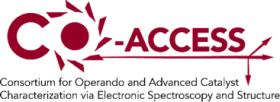
A short course sponsored by Co-ACCESS at SSRL
As SSRL transitions from step-scanning XAS to continuous scanning and quick scanning (QEXAFS), time resolution will improve from 10 minutes per spectrum to below 1 second, meaning that the number of spectra that will need to be analyzed will increase dramatically. A similar situation already exists with space-resolved data in X-ray microscopy where thousands and sometimes even millions of spectra need to be processed. With these new parameters, we need appropriate software to process these data batches and extract time- and space-resolved chemical information. This course will present examples of large XAS data sets and solutions for their batch processing, including hands-on exercises. The future in correlated data collection and analysis will also be discussed.
Register for Free Workshop
There is no cost to attend this workshop.
The workshop is limited to 25 attendees. After this number you will be placed on a waiting list.
Agenda
| Monday, June 3 2019 | ||
|
Time |
Topic |
Speaker |
|
09:00 - 09:15 |
Introduction |
Simon Bare |
|
09:15 – 10:30 |
Basics of analyzing large XAS data sets: PCA and clustering |
Florian Meirer |
|
10:30 – 10:45 |
Coffee Break |
|
|
10:45 – 11:30 |
Case studies of clustering |
Yijin Liu |
|
11:30-12:30 |
EXAFS modeling |
Alexey Boubnov |
|
12:30 – 13:30 |
Lunch Break (lunch may be purchased at the SLAC Cafe) |
|
|
13:30 – 15:00 |
Analyzing large XAS data sets: Multivariate analysis, Modulation excitation |
Florian Meirer |
|
15:00 – 15:30 |
Coffee Break |
|
|
15:30 – 16:15 |
QEXAFS at SSRL |
Oliver Müller |
|
16:15 – 16:30 |
Future Needs |
Simon Bare |
| Tuesday, June 4 2019 | ||
|
Time |
Topic |
Speaker |
|
09:00 - 12:00 |
Hands-on Tutorial |
Florian Meirer |
|
12:00- 13:00 |
Lunch Break (lunch may be purchased at the SLAC Cafe) |
|


